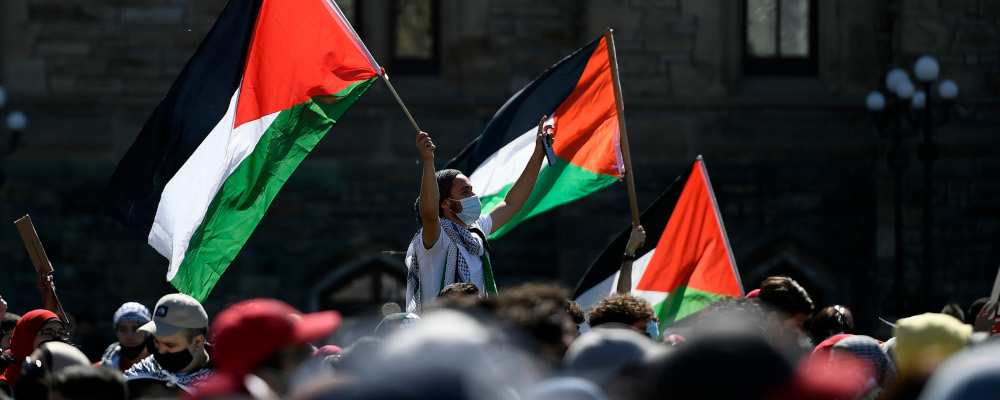As Palestinian supporters continue to organize themselves in different Canadian cities to effectively demonstrate in favour of Hamas’s abhorrent attacks on the State of Israel, the inherent tensions and limits of pluralism have been laid bare for everyone to see.
Pluralism is a key part—arguably the key part—of Canada’s conception of itself and our common citizenship. The country’s basic promise is one of peaceful co-existence. Our institutions, norms, and practices are set up to accommodate a multiplicity of viewpoints and persuasions concerning the most fundamental questions about justice, human flourishing, and what constitutes the good life.
Pluralism is also a key—arguably the key part—of my own worldview. Although, as I’ve grown older, I’ve become more comfortable in my own thinking about these questions, I’ve also grown less comfortable with the idea of imposing my answers on others. Our own limitations (what Kant referred to as our “crooked timber”) invariably constrain the individual pursuit of truth. The public square should therefore be a crowded, complicated, and contentious marketplace of ideas. The state must resist imposing a singular conception of truth on the society.
Yet pluralism cannot be an open-ended promise either. Just because our ability to discern the truth may be imperfect and incomplete doesn’t mean that we should give into an empty relativism. Some ideas are bad and wrong. We cannot permit our pluralistic commitments to provide license for those who reject our society’s basic values or even wish to do it harm. Pluralism cannot be a one-sided surrender to illiberal and reactionary forces.
We’ve witnessed in recent days these tensions and limits inherent to Canadian pluralism. While most of us mourned and lamented the inhumanity of Hamas’s terrorist attacks on Israel, a small minority among us have defended and even celebrated them. These individuals and organizations have relied on Canada’s promise of freedom to countenance and glorify the indiscriminate violence of a group designated as a terrorist organization by our own government.
There have been pro-Palestinian demonstrations across the country that have effectively affirmed Hamas’s terrorism. The videos from these pro-Hamas rallies in cities such as Mississauga and Montreal have been shocking. It must be said that rallies in support of a terrorist organization that has carried out a systematic campaign of killing women and children are incompatible with Canadian values.
Meanwhile, groups such as the Muslim Association of Canada and National Council of Canadian Muslims (which according to online records have received more than $1.34 million in federal funding between them since 2018) may be more careful in their messaging, but they’re still ultimately equivocal about what the world has witnessed. Their tendency towards “two-sideism” and other prevaricating devices have obscured the extent to which they implicitly affirm Hamas’ narrative. If in the face of overwhelming evidence of brutality and cruelty against Israelis your first instinct is to lament “the tyranny and terrorism of the Zionists” or criticize Israel’s democratic leadership, you’ve for all intents and purposes exposed your true character.
Which it must be said is fair enough as far as some pluralistic protections go. One can oppose the current Israeli government or even critique the State of Israel itself and of course still find him or herself able to avail Canada’s protections of freedom of conscience or expression. We cannot and should not police one’s thoughts per se. But it certainly doesn’t mean that radical groups are entitled to taxpayer dollars or that individuals who cross the line from reasonable disagreements to the promotion and glorification of violence shouldn’t face sanction.
These basic observations shouldn’t in and of themselves be controversial. Our commitment to pluralism must be uncompromising up and until it comes to undermine the basic security and stability of our own society. As my former boss Brian Lee Crowley has often said: “[we cannot permit] our list of freedoms to become our suicide note.”

Drawing these lines is of course complicated. Our default assumption must be highly permissive. Just because an idea is controversial or at odds with the majority’s views isn’t a reason to exclude it from the public square. The health of our society is measured in part by our willingness to protect ample space for such views. Imposing parameters around the public square therefore comes with great risk. Those parameters can be misapplied, misread, or even wielded by those whose primary goal is to constrain ideas that don’t match their own preferences. Just because it’s hard, however, doesn’t mean that it’s a task that we should shrink from.
There are perspectives that should rightly be denounced, marginalized, and precluded from receiving public dollars. Even if one is squeamish about laws and policies that criminalize acts like the glorification of terrorism, there ought to be a minimum agreement that we have a collective responsibility to condemn such behaviour in order to effectively raise its social costs and signal to those inside and outside of our society that our pluralism isn’t a license for depravity or violence.
Canada has essentially bet its future on pluralism. As our population gets more and more diverse, the multiplicity of views will grow and pluralism will be crucial for managing our diversity. I think it’s a good bet. Unlike some conservatives, I’ve tended to disagree with the instinct to mock Prime Minister Trudeau’s assertion that “diversity is our strength.” I think it’s broadly true. But if our pluralism isn’t principled, if it doesn’t involve some limits, then diversity will cease to be our strength and may eventually become the source of our undoing.
Recommended for You

The Notebook by Theo Argitis: Mark Carney’s first major tests

Falice Chin: The ‘wild and weird’ Calgary Stampede

‘A celebration of the spirit of Alberta’: Ryan Hastman on the political, economic, and cultural importance of the Calgary Stampede

Michael Geist: Children accessing porn is a problem, but government-approved age verification technologies are not the answer




